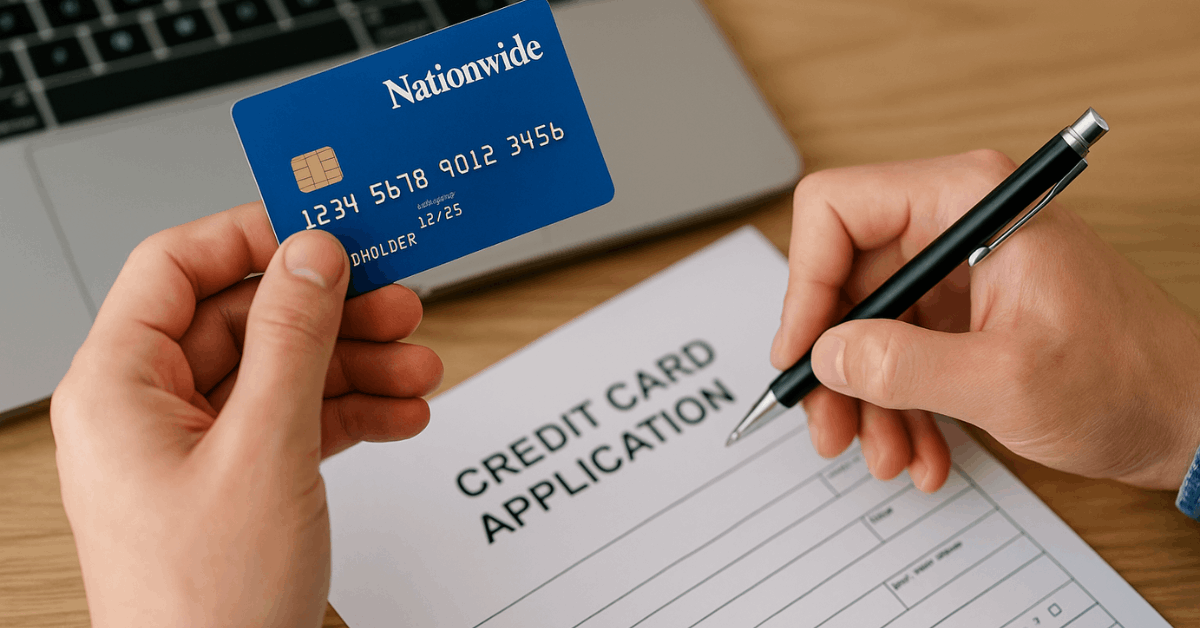Applying for a Nationwide Credit Card can give you more control over your finances. Nationwide offers different types of credit cards with useful benefits for balance transfers and purchases.
This guide helps you understand the options and requirements before you apply.
Understanding Nationwide Credit Card Options
Choosing the right credit card involves evaluating the features and benefits that best suit your needs.

Nationwide offers two main credit card options: the Purchase and Balance Transfer Credit Card and the Balance Transfer Credit Card.
Both come with 0% interest introductory offers, but they differ in their terms and periods. Knowing the details will help you decide which is right for you.
Purchase and Balance Transfer Credit Card
This card is helpful if you need time to pay off existing balances or want to make new purchases.
It offers 0% interest on balance transfers for 15 months and 0% interest on purchases for 15 months.
The representative APR is 24.9% variable, meaning it may change depending on your credit score. This card requires a Nationwide account or a mortgage to qualify.
Balance Transfer Credit Card
If your priority is to pay off existing debt, this card might be a better fit. It gives you 0% interest on balance transfers for 24 months and 0% interest on purchases for 3 months.
The representative APR is 24.9% variable, subject to your credit status. Like the other card, you’ll need an existing Nationwide relationship to apply.
How to Apply for a Nationwide Credit Card?
Before applying, make sure you meet all eligibility criteria. Nationwide requires you to have a savings account, current account, or mortgage with them.

Steps to Apply
Here's a step-by-step guide to help you apply easily:
- Check if you meet the eligibility criteria.
- Gather the required documents and information.
- Visit Nationwide's official website or a branch.
- Complete the online application or request a paper form.
- Provide accurate personal, financial, and employment details.
- Review the terms and fees before submission.
- Please submit your application and await our response.
Eligibility Requirements
Before applying for a card, it's essential to determine if you qualify. Here’s what you need to know:
- You must have a Nationwide savings account, a current account, or a mortgage.
- You need to be a UK resident.
- You must be at least 18 years old.
- You’ll need a good credit history and stable income.
Documents and Information Needed
Having the right documents ready makes applying easier. You’ll need to provide proof of identity, such as a passport or driving licence.
Proof of address is also required, like a recent utility bill or bank statement. You should also prepare details about your employment, income, and existing credit commitments.
Interest Rates and Important Disclaimers
Nationwide credit cards come with a representative APR of 24.9% variable. This means the rate can change depending on your credit profile.
The representative example assumes a credit limit of £1,200 and a purchase rate of 24.9% p.a. variable. Always check your terms carefully before applying.
Credit Card Interest
If you don’t pay off your entire balance each month, you’ll be charged interest on the remaining balance. The interest rate can vary depending on your credit profile.
It’s important to budget and pay off as much as possible to avoid high-interest costs. Paying on time also helps your credit score.
Types of Credit Card Fees
Credit card fees can add up if you’re not careful. Fees may include balance transfer fees, cash withdrawal fees, late payment fees, and servicing fees.
Check the terms of your card to understand when these fees apply. Managing your spending wisely helps you avoid unnecessary charges.
Contact Information and Support
Nationwide offers customer support to help you with your credit card needs. For general support, call 1-800-950-5114, available 24/7.
If you’re calling from outside the UK, dial 1-605-335-2222 (collect). Online account access is also available for managing your card.
Tips for Responsible Credit Card Use
It’s important to use your Nationwide credit card responsibly to avoid fees and keep your credit healthy. Here’s how you can make the most of your credit card:
- Always pay at least the minimum payment by the due date to avoid late fees.
- Keep your balance low relative to your credit limit to maintain a good credit score.
- Understand your card’s terms and fees so you’re not caught off guard.
- Pay more than the minimum whenever possible to reduce your balance faster.
- Use balance transfers strategically to pay down existing debt.
- Pay attention to your credit utilisation ratio and try to keep it below 30%.
- Check your credit report regularly to ensure accuracy.
- Avoid taking cash advances unless necessary, as they often come with higher fees and interest.
- Sign up for text or email alerts to track due dates and spending.
- Review statements every month for any errors or unusual charges.
- Use balance transfers strategically to pay down existing debt.
How Credit Cards Can Build Your Credit Score?
Using a credit card can help you build a strong credit history if managed properly. Always pay on time to avoid negative marks on your report.
Keep your spending in check to stay within your credit limit. Applying for too many credit cards at once can hurt your score, so choose wisely.
Managing Credit Limits and Credit Utilisation
Understanding your credit limit and how much of it you use (your credit utilisation) is crucial. A lower credit utilisation ratio helps boost your credit score.
Aim to use less than 30% of your total credit limit to maintain a good score. Check your balance often to stay on track.
Making Payments and Payment Options
Paying your credit card bill on time is vital to avoid fees and maintain a good credit record. Set up direct debits to ensure you never miss a payment.
Paying more than the minimum payment helps reduce your debt faster. Consider setting reminders on your phone or calendar.
What Happens if You Miss a Payment?
Missing a payment can lead to late fees, a higher interest rate, and a negative impact on your credit score. Contact Nationwide as soon as possible if you think you might miss a payment.
They may be able to help you with alternative payment arrangements. Always communicate early to avoid complications.
Conclusion: Get Started with Nationwide Credit Cards
A Nationwide Credit Card can be a valuable financial tool if used responsibly. Choose the option that best fits your needs and gather the necessary documents before applying.
Always read the terms carefully and understand the rates and fees involved. If you’re ready, apply online or contact Nationwide for assistance.




















